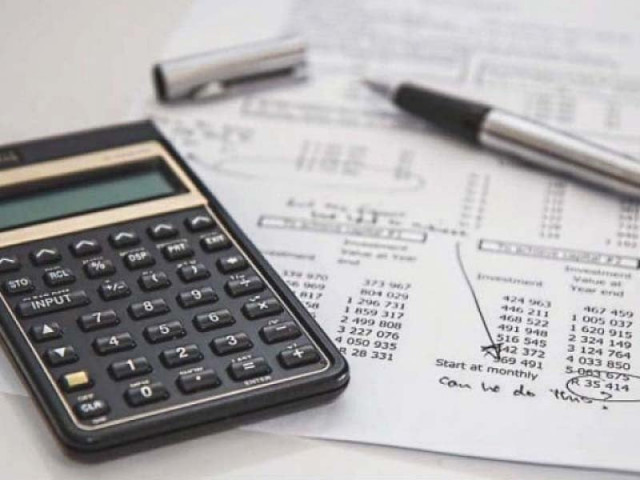Tax rate for banking companies enhanced to 42%
Ismail says banking sector has earned windfall profits from risk-free investment in govt securities

The PML-N led coalition government has increased the rate of taxes on commercial banks’ windfall gains (profit) after they apparently defied the directives to reduce the high interest rate on financing to the government. “The banking sector has earned windfall gains due to higher interest rates and risk-free investment in government securities (like T-bills and Pakistan Investment Bonds - PIBs),” Finance Minister Miftah Ismail said while presenting the budget for the next fiscal year starting July 1, 2022 in the National Assembly on Friday.
“In order to capture the real tax potential, the tax rate on banking companies is proposed to be enhanced to 42% from the current 39% inclusive of super tax.” Besides, the advance withholding tax at the rate of 1% for tax return filers and 2% for the non-filers will be collected from persons remitting money outside of Pakistan through credit, debit and prepaid cards. However, this tax would be adjustable against the tax liability, Ismail added. Commercial banks lend money to the cashstrapped government through investment in the government securities.
They have charged a historic high interest rate (cut-off yield on the securities) of over 15% on financing to the government in a recent auction of T-bills. The rate hovered below 10% in November 2021. Commercial banks avoided reducing the interest rate despite the central bank’s repeated directives to rationalise the rate. The State Bank of Pakistan (SBP) also supplied huge liquidity worth around Rs6 trillion to the banks in the past couple of weeks to persuade them to reduce the interest rates. However, the exercise went into vain as the commercial banks’ interest rates remained on an uptrend.
The government has no other option but to borrow from commercial banks for budgetary expenditure after the ousted PTI government passed a law for stopping borrowing from the central bank under the IMF’s $6 billion loan programme a few months ago. “The increase in the rate of tax on banking companies to 42%, including an additional 3% super tax, stands negative for banks,” Arif Habib Limited (AHL) economist Sana Tawfik said in post-budget comments. Initially, the taxes levied on the banking sector stood at 39%, which included 35% corporate tax and 4% super tax.
In the budget for FY23, the government has decided to revise the tax to 42%. In addition to the increased rate of 42%, another “additional 2% tax is also being levied (on banks). We believe this will impact profitability of the banking sector adversely,” she said. “Our estimates show a negative impact of 10% on the profitability of the banks,” she said, adding that from the government’s point of view, increased tax rates would help it “collecting additional Rs15-17 billion in tax revenue.”
“With the government’s heavy reliance on borrowing from banks (other than SBP) in order to finance budget deficit, we believe, this (government borrowing) bodes well for the banks’ earnings.” Experts have said the other day the central bank has kept increasing its key policy rate to narrow down gap between the commercial bank’s interest rate and the central bank’s key policy rate. “Earlier, commercial banks used to adjust their interest rate in line with the central bank key policy rate,” Tawfik.
The commercial banks are exploiting the situation through charging increased interest rate, as they know the government has no other option but to borrow from them after central bank closed its door on the government borrowing for budgetary purpose. Technically speaking, however, the sky-rocking inflation reading in the country has created room for the commercial banks to charge higher interest rate as their rates usually remain slightly higher than the inflation reading.
The country is expected to witnessed inflation reading at or over 16% in June after the government increase petroleum product prices and power tariff as prerequisite for resuming IMF $6 billion loan programme. Secondly, the central bank is highly expected to further increase key policy rate by 100-150 basis points in its next scheduled meeting to review its key policy rate. The central bank has so far increased its benchmark interest rate cumulatively by 675 basis points since September 2021 to 13.75% at present.
Workers’ remittances drop
The flow of workers’ remittances from overseas Pakistanis dropped huge 25% to $2.33 billion in May 2022 compared to record high at $3.12 billion in the prior month of April. The remittances decreased by 7% in the month compared to the same month last year “largely reflecting the usual seasonal post Eid decline and associated long holiday,” the central bank said in press statement.
“Workers’ remittances have (however) continued to remain above $2 billion mark since June 2020.” Cumulatively, in the first 11-month of current fiscal year 2022, the remittances have grown 6.3% to at $28.4 billion compared to the same period of the last year. Remittances in May 2022 were mainly sourced from Saudi Arabia ($542 million), United Arab Emirates ($435 million), United Kingdom ($354 million) and the United States of America ($233 million).


















COMMENTS
Comments are moderated and generally will be posted if they are on-topic and not abusive.
For more information, please see our Comments FAQ